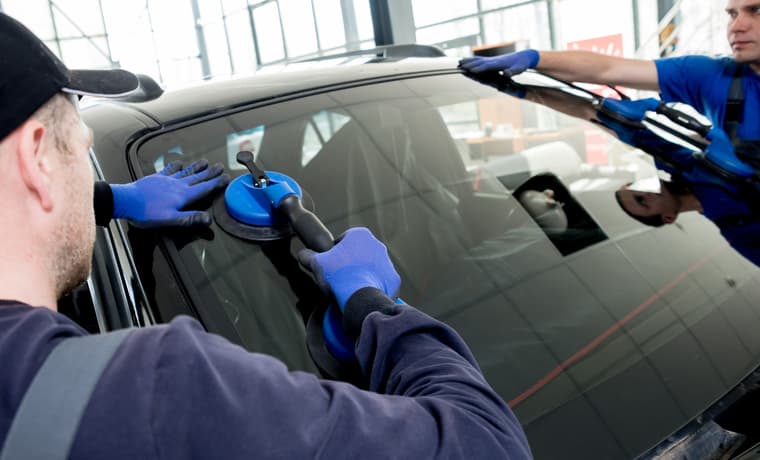Why You Should Fix A Chipped Windscreen Before Winter
Prevent Chips Turning Into Cracks

No-one likes a chipped windscreen. That unmistakable sound when something flicks up off the road and hits your glass, leaving you wondering if the worst has happened, or you’ve just accidentally sat on some bubble wrap.
But when winter arrives, a chipped windscreen goes from being a minor annoyance to a major hazard. Freezing temperatures, violent winds and heavy snowfall can all cause a little chip to turn into a massive crack, leaving your car stranded and you out of pocket.
We look at why you should fix a chipped windscreen before winter, and how it could save you stress and money later on.
WHY YOU SHOULD FIX A CHIPPED WINDSCREEN SOONER RATHER THAN LATER
A chipped windscreen could, at any time, turn into a much bigger crack. The pressure put on your glass by wind, driving fast, and even going over speedbumps could cause the chip to expand, leaving you, and your car, in a lot of trouble.
Even the smallest chips could develop and turn into a bigger problem.
As you drive, the chip will gradually expand, and while at first it might not be noticeable, before you know it there could be a much bigger crack that would be dangerous to ignore.
If you end up with multiple chips, easily possible if you’re driving over rough terrain, they can quickly join up, potentially causing your whole windscreen to shatter and shards of glass to fly everywhere. Not safe at the best of times, let alone when you’re driving.
Fixing a chip now could save you a lot of headaches, and money, in the future. The average price of fixing a small windscreen chip is only around €45, while a brand new windshield could be anywhere up to €500 depending on the type of car you drive.
Save yourself some money and get your chips fixed now. There are far more fun things to spend it on.
HOW CHIPPED WINDSCREENS OCCUR
There are lots of things that can cause a chip to appear in your windscreen. Anything from a rock flicking up from a passing car, through to grit that’s laid during winter, or even aggressive bird poo can cause damage, all without you doing anything wrong.
But there are also things you are responsible for that can make a chip happen. Washing your car with an abrasive sponge can scratch the glass, as can spraying it too closely with a powerful pressure washer.
As annoying as it is to get any kind of chip, trust us, it’s much more annoying when you do it yourself.
A small chip might not seem like an immediate problem. So long as you can still see, you might not even notice it while you’re driving. But as that chip grows, (and oh boy, it will,) the crack it turns into could cause serious problems.
If your windscreen shatters while you’re driving, not only will it be very dangerous to you and other road users, but it could also invalidate your car insurance, as you were effectively driving a car that wasn’t fit for the road.
HOW WINTER AFFECTS CHIPPED WINDSCREENS
There’s every chance that Frank Sinatra, writer of the lyrics, “The weather outside is frightful,” was thinking of winter driving conditions when he penned Let It Snow.
While winter conjures up images of cosy fires and cuddly nights in, for those of us who have to drive in the cold, it can be a lot more stressful.
As the weather gets colder, the risk of windscreen chips cracking only gets greater. Freezing temperatures put extra strain on your windscreen, and any chips will be the first to fall victim to the frosty bite. As the glass freezes, then warms up again, it will contract and expand, leading the chips to shatter.
And that’s before you get onto snow. Snow might be fun, but it’s also very heavy, and unlike rain it won’t fall off your car the second it lands. The weight of the snow sitting overnight will put stress on your windscreen, and that could be all it takes to leave it shattered.
Finally, let’s talk about heat. Winter has a nasty habit of causing your windscreen to mist up, and the only way to fix that is by blasting hot air at it from your car’s heaters. If you do that with a chip, the hot air will mix with the cold air outside, and your windscreen could end up all over your dashboard.
WHAT CAN YOU DO TO AVOID CHIPPED WINDSCREENS?
While a flying rock might seem like an unfortunate act of nature, there are things you can do to reduce your risk.
-
Stay Two Car Lengths Behind The Car In Front Of You
Staying two car lengths behind the car in front of you is not only safer driving in general, but it will also mean any rocks that do get kicked up might not reach you. -
Reduce Your Speed
The faster you drive, the more impact any flying objects will have when they hit your windscreen. Just reducing your speed by a couple of miles per hour can significantly reduce the chance of damage being caused. -
Avoid Roadworks
Not only are roadworks a source of delays, they can also cause damage to windscreens. Pneumatic drills and diggers can send bits of rubble flying, hitting your car as you drive past. Try and plan your trip to avoid roadworks when possible. -
Steer Clear Of Potholes
Potholes can be bad news for all parts of your car, damaging tyres, axles and even your entire chassis. They also do bad things for windscreens. If you see one, steer around it if possible, or slow right down as you go over it.
